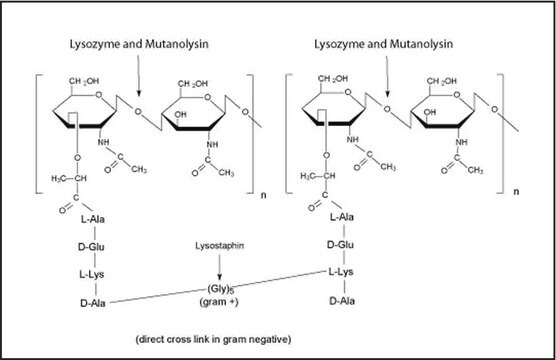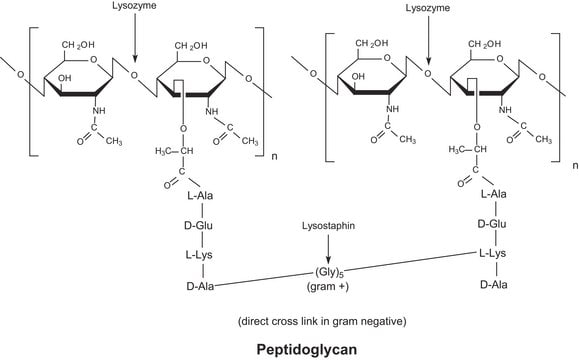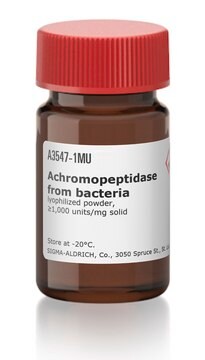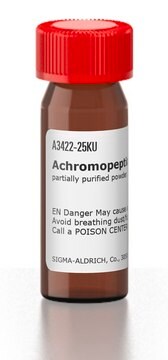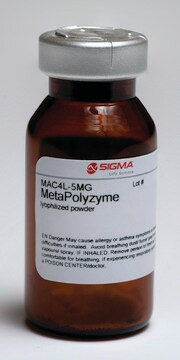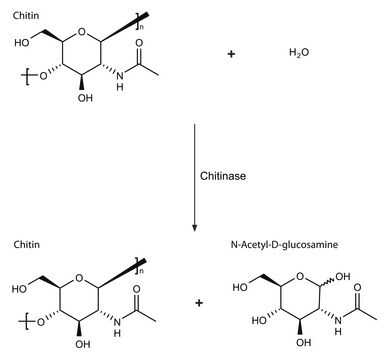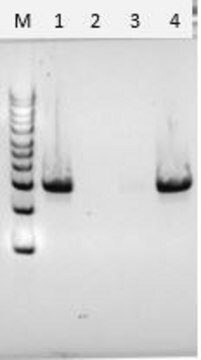Wszystkie zdjęcia(1)
Kluczowe dokumenty
SAE0196
Achromopeptidase from bacteria
free of DNA contaminants, suitable for Microbiome research
Synonim(y):
Bacterial Protease
Zaloguj sięWyświetlanie cen organizacyjnych i kontraktowych
About This Item
Kod UNSPSC:
12352204
NACRES:
NA.54
Polecane produkty
pochodzenie biologiczne
bacterial
Poziom jakości
Postać
lyophilized powder
aktywność właściwa
≥1000 U/mg
Właściwości
DNA free
metody
DNA extraction: suitable
przydatność
suitable for cell lysis
Zastosowanie
cell analysis
Warunki transportu
ambient
temp. przechowywania
−20°C
Opis ogólny
Achromopeptidase is useful for lysis of Gram-positive bacteria that are resistant to lysozyme, as well as Gram-negative organisms. Achromopeptidase has been shown to contain two bacteriolytic proteases. This product is free of detectable microbial DNA and is suitable for microbiome research
Zastosowanie
Achromopeptidase is useful for lysis of Gram-positive bacteria that are resistant to lysozyme, as well as Gram-negative organisms. Achromopeptidase has been shown to contain two bacteriolytic proteases.
The study of microbial communities has been revolutionized in recent years by the widespread adoption of culture independent analytical techniques such as 16S rRNA gene sequencing and metagenomics. Since DNA contamination during sample preparation is a major problem of these sequence-based approaches, DNA extraction reagents free of DNA contaminants are essential. This product undergoes strict quality control testing to ensure the absence of detectable levels of contaminating microbial DNA using 35 cycles PCR amplification of 16S and 18S rDNA using universal primer sets.
The study of microbial communities has been revolutionized in recent years by the widespread adoption of culture independent analytical techniques such as 16S rRNA gene sequencing and metagenomics. Since DNA contamination during sample preparation is a major problem of these sequence-based approaches, DNA extraction reagents free of DNA contaminants are essential. This product undergoes strict quality control testing to ensure the absence of detectable levels of contaminating microbial DNA using 35 cycles PCR amplification of 16S and 18S rDNA using universal primer sets.
Działania biochem./fizjol.
Achromopeptidase is a lysyl endopeptidase that has a molecular weight of approximately 27 kDa. Optimum pH is 8.5-9.
Cechy i korzyści
Contains two bacteriolytic proteases for efficient lysis of Gram-positive bacteria and Gram-negative organisms
Free of detectable microbial DNA, ensuring the accuracy of metagenomics and other culture-independent sequencing methods
Undergoes strict quality control testing to ensure the absence of detectable levels of contaminating microbial DNA
Optimum pH of 8.5-9 allows for use in a wide range of microbiome studies
Free of detectable microbial DNA, ensuring the accuracy of metagenomics and other culture-independent sequencing methods
Undergoes strict quality control testing to ensure the absence of detectable levels of contaminating microbial DNA
Optimum pH of 8.5-9 allows for use in a wide range of microbiome studies
Definicja jednostki
One unit will lyse 0.4 μg of Micrococcus lysodeikticus per minute by turbidimetric detection at 600 nm when suspended in buffer at pH 8.0 at 37 °C.
Ta strona może zawierać tekst przetłumaczony maszynowo.
Hasło ostrzegawcze
Danger
Zwroty wskazujące rodzaj zagrożenia
Zwroty wskazujące środki ostrożności
Klasyfikacja zagrożeń
Resp. Sens. 1
Kod klasy składowania
11 - Combustible Solids
Klasa zagrożenia wodnego (WGK)
WGK 3
Temperatura zapłonu (°F)
Not applicable
Temperatura zapłonu (°C)
Not applicable
Certyfikaty analizy (CoA)
Poszukaj Certyfikaty analizy (CoA), wpisując numer partii/serii produktów. Numery serii i partii można znaleźć na etykiecie produktu po słowach „seria” lub „partia”.
Masz już ten produkt?
Dokumenty związane z niedawno zakupionymi produktami zostały zamieszczone w Bibliotece dokumentów.
Nasz zespół naukowców ma doświadczenie we wszystkich obszarach badań, w tym w naukach przyrodniczych, materiałoznawstwie, syntezie chemicznej, chromatografii, analityce i wielu innych dziedzinach.
Skontaktuj się z zespołem ds. pomocy technicznej